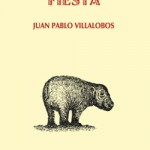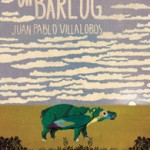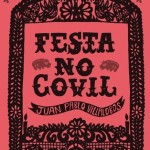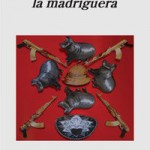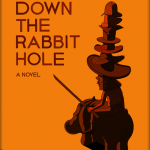by Iza Wojciechowska and Rosalind Harvey
“Some people say I’m precocious,” begins Juan Pablo Villalobos’ super-slim, super-fast first novel, Down the Rabbit Hole. What follows is a beautiful, heart-breaking story told from the perspective of Tochtli, a precocious kid whose dad is a major Mexican drug lord. Tochtli has seen people murdered and has found his father’s gun room, but those things aren’t as important to him as collecting hats and acquiring a Liberian pygmy hippopotamus. Slowly, though, he begins to reconcile the world he understands with the world as it really is. Written in Spanish and translated by Rosalind Harvey, the book is an incredible debut—and a wonderful work of translation. This is Rosalind’s first solo translation, having previously worked with Anne McLean to co-translate Oblivion by Hector Abad (FSG, 2012) and Dublinesque by Enrique Vila-Matas (New Directions, 2012). I talked with Rosalind about Tochtli’s advanced vocabulary, her advice for young translators, and about the potential for more mainstream Estonian chick lit, Indonesian thrillers, and Bolivian erotica.
Down the Rabbit Hole is the first book you have translated solo. How was it different than working with a co-translator? Do you have a preference for translating alone or with a partner?
The main difference is the sense of responsibility—working with another translator, especially one of Anne [McLean]’s stature, you always feel a little more relaxed as you know someone else’s eyes will be checking over your work (as well as the editor’s, of course). And the books I did with Anne were by authors who had either specifically requested her or that she had ‘discovered,’ so while I loved working on them I knew I never fully owned them, so to speak. So the fact that I read Juan Pablo’s book shortly after it came out in Spanish, then took it to And Other Stories to persuade them of its worth, then translated it all working quite closely with Juan Pablo, meant I felt a huge responsibility to get it right and to do his work justice in English. Which is scary, but the flipside of that is that you get to enjoy the end result even more than with a co-translation! I enjoy both ways of working though, and am currently doing another co-translation with Frank Wynne, and further down the line I would love to give a leg up to a less experienced translator by co-translating with them, as that’s what helped to get me where I am today.
Down the Rabbit Holes (international editions):
How did you first get into translation, and then how did you decide you could make a career out of it?
I had done little bits of translation at university and always loved it but had never thought of it as a career. After I graduated I worked for a few years as a bookseller and then I started going to poetry translation workshops run by the Poetry Translation Centre here in London, where I met someone who told me about the wonderful translation summer school run by the British Centre for Literary Translation at the University of East Anglia in Norwich. I attended it the following year, where I met Anne and realized that literary translation was something you could do as a career, and then I took UEA’s MA in literary translation then had a year or so of bookselling, Spanish tutoring and other odd jobs while doing little bits of translation and trying to be stubborn and not to give up on the idea.
Down the Rabbit Hole is fascinating for several reasons, not least because it’s told from the perspective of a child. How did that affect the experience of translating the book?
For me the voice is the most important aspect of translation (and literature in general, I think), whether it’s a child or an adult narrator. When the voice is clear and strong and believable enough to remain in your mind, that’s your starting point. I read Roddy Doyle’s Paddy Clarke Ha Ha Ha and Mark Haddon’s The Curious Incident of the Dog in the Night-Time, but mainly I was just listening out for Tochtli’s voice and trying to recreate it in English.
Tochtli, the precocious child-protagonist, is preoccupied with words, and consistently uses several throughout the book: devastating, sordid, immaculate, to name a few, all of which are fairly abstract adjectives with many possible synonyms. Was it obvious to you from the start what words to use here in English, or did Tochtli’s vocabulary—which serves as an important constant—ever exist in other iterations?
I played around with a few different versions, but the most interesting one was the word I ended up translating as “devastating”—in Spanish it’s fulminante, which means sudden and crushing or devastating, but only really in the context of physical violence. In my translation it was a word that was often picked up on by readers and reviewers to describe the book as a whole, which I thought gave it a nice resonance.
Are you generally a reader of books in translation, either from Spanish or from other languages? How do other books in translation inform your own work, if at all? Are there any translators you particularly admire?
I do read quite a lot in translation; I try to read books written in Spanish in the original, and translated books I have admired in the last year or so include All The Lights by Clemens Meyer, translated by Katy Derbyshire, and a Swedish thriller called Blackwater by Kerstin Ekman, translated by Joan Tate. Obviously I admire Anne McLean a great deal and she taught me a lot about how to translate, and I also admire Suzanne Jill Levine for her creativity and humor (she has a great book about translating Cabrera Infante which I recommend), and the great Edith Grossman is incomparable.
It’s generally acknowledged that literature translated into English gets fairly bypassed by readers. Do you agree? What do you think can be done (or is already being done) to bring translations further toward the forefront? Why is doing so important?
Yes, it does happen but only because they aren’t given access to it! Things are looking up though—I know for a fact that there are interested and varied audiences for translation after having done three translation-related events this year in the UK, which were all very popular and elicited some really interesting responses. I think we need to translate and publish more of a range of writing: good literature is wonderful, but difficult or avant-garde work is not for everyone and so I’d like to see more Estonian chick lit, Indonesian thrillers or Bolivian erotica. People read that stuff as long as it’s good, it doesn’t matter where it’s from, so bring it on! As a reader I would say that reading translation is no more or less important than reading a literature, but as a translator I guess I say that reading translations can give you a broader vision of the world and of people and emotions, making you more aware of the huge differences but also similarities between people. Good literature from anywhere can do that.
On a related note, why is translation important to you, personally? What delights you about the work you do?
Translation is important to me as someone who’s always loved words, language, and wordplay in particular. I love punning, and playing around with words, and I always have ever since I learned to speak. When I was younger I want to be a writer, and translation is a form of writing. It is also often said that it’s the closest form of reading, and I love the chance my work gives me to really get inside a text, as well as getting inside a character’s head, and to be intimately involved with the creation of a book.
What are you working on next?
I’m really excited to be working on a co-translation (with Frank Wynne) of some of Picasso’s letters and poems, which will be out with Penguin Classics at some point next year; then there’s Juan Pablo’s second novel, Quesadillas, which is hilarious; and I have a couple of other things in the pipeline too.
Can you describe your average process when translating a book? I.e. how familiar do you get with it in Spanish, how much do you use dictionaries, what is the revision process like? Do you work closely with the author?
I normally read the book once through in Spanish, then do a reasonably speedy first draft, which I’ll print out—I try and work on subsequent drafts on paper if I can. The second drafts I do looking closely at the original to make sure there are no mistakes and everything is in there more or less as it should be, and then beyond that I try and work towards getting the text to feel more English, without looking at the original too much. I use online dictionaries, including the Real Academia Española, and I also go on quite a lot of forums, especially when there’s specialist vocabulary that I need to figure out. In all the books I’ve done so far I have e-mailed questions to the author, but Juan Pablo is the one I’ve worked the most closely with. We talk on Skype and have obviously met in the flesh several times too, which is really helpful when it comes to getting into an author’s style and tone of voice.
Do you have any advice for translators just starting out?
I would say be polite but stubborn (!), don’t charge too little for your work (it’s important), go to as many events about literature and translation as you can and talk to translators and authors and publishers. Most of the work you’ll get is by word of mouth, so you need to get out there, as scary as that may be. And it’s not really scary when you consider that all literary translation networking is basically about you talking to another person about the thing you both love (and you have to do it for love, that’s another good tip—it won’t make you millions!). Oh, and read—a lot!
Rosalind Harvey co-translated Oblivion by Hector Abad (FSG, 2012) and Dublinesque by Enrique Vila-Matas (New Directions, 2012). Her most recent translation – Down the Rabbit Hole, by Juan Pablo Villalobos (FSG) – was shortlisted for the Guardian First Book Award and is now available.
Iza Wojciechowska works at FSG. You can find her online @Iza_Woj.

